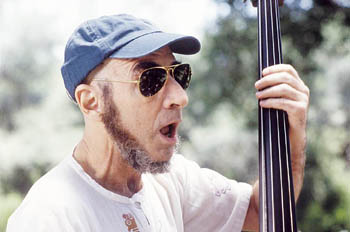![[Metroactive Movies]](/movies/gifs/movies468.gif)
[ Movies Index | Show Times | Santa Cruz Week | SantaCruz Home | Archives ]
Shearer Energy
Somewhere between NPR, 'The Simpsons' and the next Spinal Tap tour, Harry Shearer is finding time to bring his film 'Teddy Bears' Picnic' to Santa Cruz
By Steve Palopoli
In Mixed Nuts, Lawrence J. Epstein's recent book about the history of American comedy teams, he tracks with a fascinating precision how the art evolved from one-comic acts like George Burns and Gracie Allen to duos like Laurel and Hardy who spun off into their own world with no straight man to keep them grounded in the audience's reality. After that, says Epstein, came pickup comedy teams like Bob Hope and Bing Crosby, or Dean Martin and Jerry Lewis, who took the competition for laughs to a new level. Finally, the duo dynamic exploded into the comedy ensemble, with troupes at Groundling and on Saturday Night Live or Seinfeld replacing the classic tag-team setup entirely.
Thanks to Harry Shearer and friends, comedy may have evolved again. Films like Rob Reiner's This Is Spinal Tap; Christopher Guest's Waiting for Guffman, Best in Show and A Mighty Wind; and now Shearer's Teddy Bears' Picnic have snowballed into a continuum of comic acting, writing and directing talent that almost transcends the concept of a comedy team.
"It feels more like a comedy commune," says Shearer, reached by phone prior to bringing Teddy Bears' Picnic, which he wrote and directed, to the Rio this Sunday, May 8, for a screening that benefits Jacob's Heart, Friends of the Santa Cruz Public Library and the Ragejax Foundation. The film stars such communist regulars as Michael McKean, Fred Willard and John Michael Higgins, known for their work in Guest's films and in the case of McKean and Willard, for pioneering the improv-heavy, faux-documentary style in Spinal Tap. Shearer himself, of course, co-wrote and co-starred as bassist Derek Smalls in Tap, considered by some to be the cult movie to end all cult movies.
This whole group is a bit like a secret society as well--who knows how they manage to make time for all these projects? Turns out there aren't any blood oaths, though, just lots of blood, sweat and tears that go into making it work, as Shearer discovered for himself on Teddy Bears' Picnic.
"The toughest part of this film was that we had 32 speaking parts and the poor guy who did the scheduling, the first AD, was ripping up his schedule every day and starting over," he says. "He was going nuts."
What made it worth it on both ends, no doubt, is the same reason that Shearer gives for always trying to make time for his friend Guest's projects.
"Christopher knows that if he wants me, I'll do whatever I can to be available for him, because it's so much fun," says Shearer. "When something comes along that's just utterly fulfilling, you want to get more of that."
Shearer's film is also a "mockumentary" (there's not a lot of love for that word in the commune), satirizing Northern California's infamous Bohemian Grove with a thinly disguised "Zambizi Glen," where the rich and powerful drink themselves sick, screw hookers and in general act like the worst frat boys on the planet. But neither his story nor his shooting schedule allowed for the open-ended, free-associative comedy this group is used to.
"I said to everybody in the cast, 'I can't afford to shoot this improvisationally, nor would it be right for the story. But I know you all have a contribution to make in that regard, so if you think of stuff that you want to say that you like better than the script, or that you think would help the script, just say it to me before we start shooting and I'll incorporate it,'" says Shearer.
He shot the entire film in 18 days in 480P digital film. It was a guerilla operation all the way, ironic considering that from his film work to his characters on The Simpsons to his weekly NPR program Le Show, Shearer is literally one of the most recognizable voices in American comedy. But he's neither surprised nor daunted by mainstream Hollywood's lack of support.
"Well, you know, Spinal Tap was a fluke, too. All the major studios turned that movie down," he says. "I think there really hasn't been room in the studio business for the kind of work I've been doing since probably Ernst Lubitsch left the business, or Billy Wilder. Those were the last guys who really did social satire for a Hollywood studio."
Copyright © Metro Publishing Inc. Maintained by Boulevards New Media.
For more information about Santa Cruz, visit santacruz.com.
![]()

Is He Going to Do 'Stonehenge' Sunday Night?: Harry Shearer, who brings his film 'Teddy Bears' Picnic' to the Rio Sunday night, returned to his musical-satire roots in 'A Mighty Wind.'
Harry Shearer will screen Teddy Bears' Picnic on Sunday, May 8,
at 7pm at the Rio Theatre, 1205 Soquel Ave., Santa Cruz; a Q&A with Shearer follows. This is a benefit for Jacob's Heart, Friends of the Santa Cruz Public Library and the Ragejax Foundation. Tickets are $19; call 831.479.9421.
From the May 4-11, 2005 issue of Metro Santa Cruz.